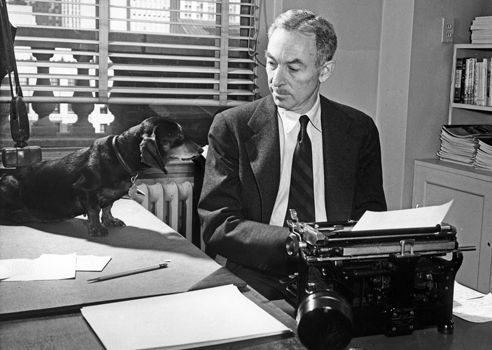Reading time: Just over 1 minute
This is my weekly installment of “writing about writing,” in which I scan the world to find websites, books and articles to help other writers. Today I discuss a blog post on the daily routines of 12 famous writers…
Did you know that E.B. White (pictured above) usually wrote in his busy living room, with family coming and going all the time? Here’s what he had to say about it:
The members of my household never pay the slightest attention to my being a writing man — they make all the noise and fuss they want to. If I get sick of it, I have places I can go. A writer who waits for ideal conditions under which to work will die without putting a word on paper.
I learned about White’s routine in a fascinating James Clear blog post headlined The Daily Routines of 12 Famous Writers (And How They Can Help You Succeed.) In addition to White, Clear also looked at the habits of:
- Haruki Murakami
- Ernest Hemingway
- Henry Miller
- Kurt Vonnegut
- Nathan Englander
- Jodi Picoult
- Maya Angelou
- Barbara Kingsolver
- Karen Russell
- A.J. Jacobs
- Khaled Housseni
Like most writers I love hearing about how others do the same work. Perhaps it’s an escape from the loneliness of writing or maybe we’re all insecure and desperate to know how professionals manage to approach the task. But I really enjoyed reading this piece.
Here are the three conclusions (I’ve edited them lightly) James Clear reached in his summary:
- Push yourself physically to prepare to do the hard work mentally. Vonnegut did pushups as a break from writing. Murakami runs 10 kilometers each day. A.J. Jacobs types while walking on a treadmill.
- Do the most important thing first. Notice how many excellent writers start writing in the morning? That’s no coincidence. They work on their goals before the rest of the day gets out of control.
- Embrace the struggle. Housseni said that his first drafts are “difficult” and “laborious” and “disappointing.” Russell called her writing “bad.” Kingsolver throws out a hundred pages before she gets to the first page of a book. What looks like failure in the beginning is often the foundation of success.

